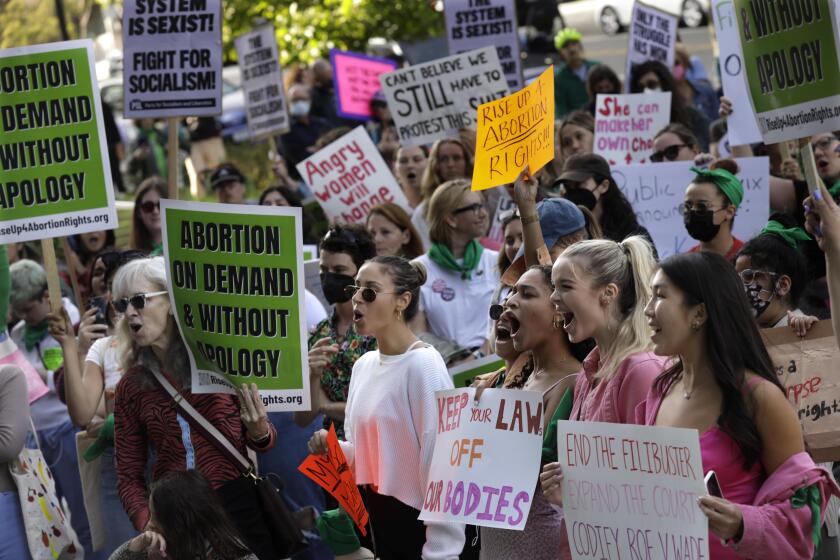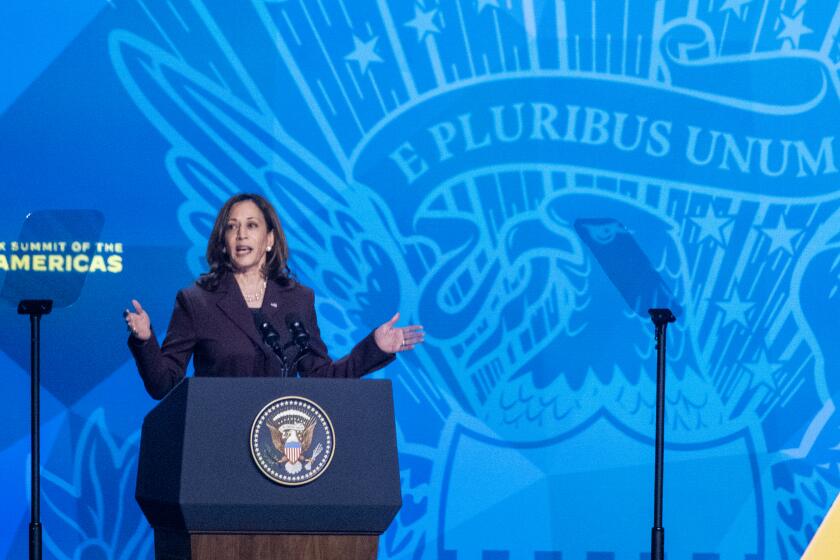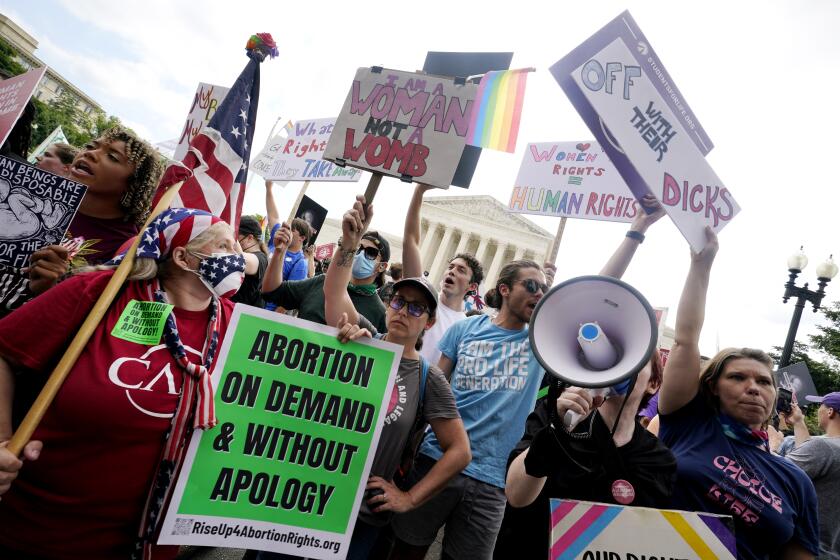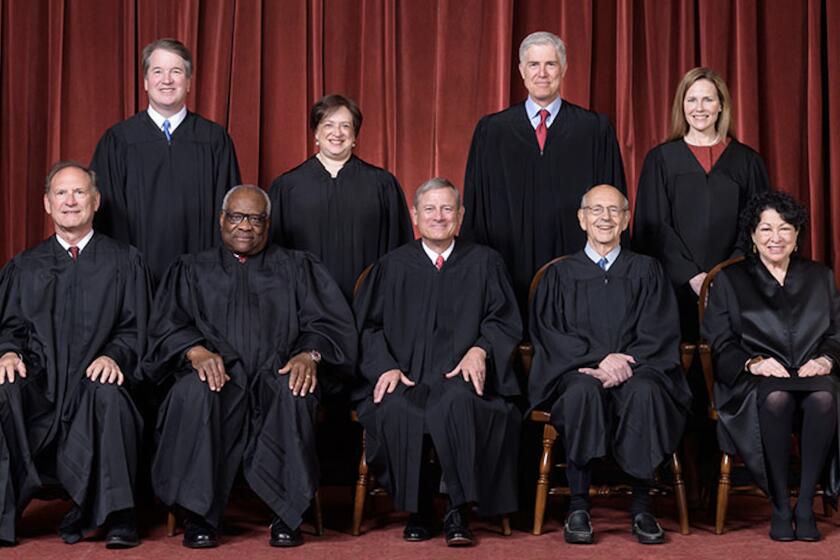Supreme Court’s abortion ruling sets off new court fights

- Share via
NEW ORLEANS — The fall of Roe vs. Wade shifted the battleground over abortion to courthouses around the country Monday, as one side sought quickly to put statewide bans into effect and the other tried to stop or at least delay such measures.
The U.S. Supreme Court’s decision Friday to end constitutional protection for abortion opened the gates for litigation from all sides. Temporary delays were successful in Louisiana and Utah after state judges issued orders Monday that blocked abortion bans in those states from going into effect. Meanwhile, a federal judge in South Carolina said a law restricting abortions after six weeks of pregnancy would take effect immediately there.
Much of Monday’s court activity focused on “trigger laws,” adopted in 13 states that were designed to take effect swiftly upon last week’s Supreme Court ruling. Additional lawsuits could also target old antiabortion laws that were left on the books and went unenforced under Roe. Newer abortion restrictions that were put on hold pending the Supreme Court ruling are also coming back into play.
“We’ll be back in court tomorrow and the next day and the next day,” Nancy Northup, president and CEO of the Center for Reproductive Rights, which argued the case that resulted in the high court ruling, said Friday.
Rulings came swiftly in Utah and Louisiana. A Utah judge on Monday temporarily blocked that state’s near-total abortion ban, after Planned Parenthood challenged a trigger law there that contains narrow exceptions. A judge in New Orleans, a liberal city in a conservative state, temporarily blocked enforcement of the state’s trigger-law ban on abortion, after abortion rights activists argued that it is unclear. The ruling is in effect pending a July 8 hearing.
At least one of the state’s three abortion clinics said it would resume performing procedures Tuesday.
Here’s everything you need to know about the U.S. Supreme Court’s decision on Roe vs. Wade.
“We’re going to do what we can,” said Kathaleen Pittman, administrator of Hope Medical Group for Women, in Shreveport, La. “It could all come to a screeching halt.”
Louisiana Atty. Gen. Jeff Landry, a Republican and staunch abortion opponent, said he will fight the judge’s ruling and enforce the law.
“We would remind everyone that the laws that are now in place were enacted by the people through State Constitutional Amendments and the LA Legislature,” Landry tweeted Monday.
Also Monday, abortion rights advocates asked a Florida judge to block a new law there that bans the procedure after 15 weeks with some exceptions and is set to take effect this week. A ruling on that is expected Thursday.
Abortion rights activists also went to court Monday to try to fend off restrictions in Texas, Idaho, Kentucky and Mississippi, the state at the center of the Supreme Court ruling. The American Civil Liberties Union of Arizona filed an emergency motion there on Saturday seeking to block a 2021 law they worry can be used to halt all abortions.
Marjorie Dannenfelser started out as a pro-choice Republican. After changing her mind in college, she set out to outlaw abortion across the United States.
In Friday’s ruling, the Supreme Court left it to the states to decide whether to allow abortion.
“The expectation is that this will result in years of legislative and judicial challenges,” said Jonathan Turley, a professor at the George Washington University law school.
As of Saturday, abortion services had stopped in at least 11 states — either because of state laws or confusion over them.
In some cases, the lawsuits may only buy time. Even if courts block some restrictions from taking hold, lawmakers in many conservative states could move quickly to address any flaws cited.
That’s likely to be the case in Louisiana. The plaintiffs in the lawsuit filed in state court don’t deny that the state can now ban abortion. Instead, they contend Louisiana now has multiple, conflicting trigger mechanisms in the law.
Vice President Kamala Harris says she worries other rights might be endangered after the Supreme Court overturned Roe vs. Wade, the landmark case legalizing abortion.
They also argue that state law is unclear on whether it bans an abortion prior to a fertilized egg implanting in the uterus. And while the law provides an exception for “medically futile” pregnancies in cases of fetuses with lethal abnormalities, the plaintiffs noted the law gives no definition of the term.
Around the country, challenges to other trigger laws could be made on the grounds that the conditions to impose the bans have not been met, or that it was improper for a past legislature to bind the current one.
Laura Hermer, a professor at Mitchell Hamline School of Law in St. Paul, Minn., said other challenges might call into question whether state laws sufficiently and clearly allow for exceptions to protect the life or health of a pregnant woman.
Now that the high court has ruled that the U.S. Constitution does not guarantee the right to an abortion, abortion rights supporters will make the case that their state constitutions protect such a right.
The U.S. Supreme Court’s decision allowing states to ban abortion is stirring alarm among LGBTQ advocates.
A judge heard arguments on that issue Monday in Florida, where attorneys tried to block a new law from going into effect Friday. The ban beyond 15 weeks has exceptions to save the pregnant woman’s life or prevent physical harm or in cases where the fetus has a fatal abnormality. The ACLU of Florida argued that the law violates the Florida Constitution.
James Bopp Jr., general counsel for the National Right to Life Committee, said the wave of suits from abortion rights advocates is not surprising.
“We know that the abortion industry has basically unlimited funds, and its allies have basically unlimited funds, and of course they’re fanatical about abortion on demand throughout pregnancy,” Bopp said in an interview.
But he said that that the Supreme Court ruling should preclude abortion rights supporters from prevailing in any federal challenges. And he called efforts based on state constitutions “fanciful.”
Still other cases could be filed as states try to sort out whether abortion bans in place before Roe was decided — sometimes referred to as “zombie laws” — apply now that there is no federal protection for abortion.
For instance, Wisconsin passed a law in 1849 banning abortions except to save the life of the mother. Atty. Gen. Josh Kaul, a Democrat, said he does not believe it is enforceable. Abortion opponents have called on lawmakers to impose a new ban.
The five justices who overturned Roe vs. Wade were nominated by three Republican presidents. Most of the votes to confirm the justices were by men.
In the meantime, Planned Parenthood of Wisconsin said it immediately suspended abortions.
In Michigan, Planned Parenthood challenged a 1931 abortion ban before last week’s Supreme Court ruling. In May, a judge said the ban could not be enforced because it violates the state’s constitution. Abortion rights supporters are now trying to get a proposed state constitutional amendment on the ballot in November to protect abortion and birth control.
Idaho, Oklahoma and Texas have adopted laws that allow people to seek bounties against those who help others get abortions. It is an open question as to whether that means people can be pursued across state lines, and legal challenges over the issue are likely to come up in cases of both surgical abortions and those involving medicine mailed to patients.
The California Legislature, controlled by Democrats, passed a bill Thursday to shield abortion providers and volunteers in the state from civil judgments imposed by other states. Gov. Gavin Newsom signed it Friday.
In liberal Massachusetts, Gov. Charlie Baker, a Republican, signed an executive order Friday that prohibits state agencies from assisting other states’ investigations into anyone who receives a legal abortion in Massachusetts.
The challenge filed in Arizona, where most providers stopped offering abortions, said the legal questions are urgent.
Even if abortions resume in weeks or months, the plaintiffs said, “patients may be at greater risk of medical complications or may lose access to abortion altogether as a result of the delay.”
More to Read
Sign up for Essential California
The most important California stories and recommendations in your inbox every morning.
You may occasionally receive promotional content from the Los Angeles Times.

















